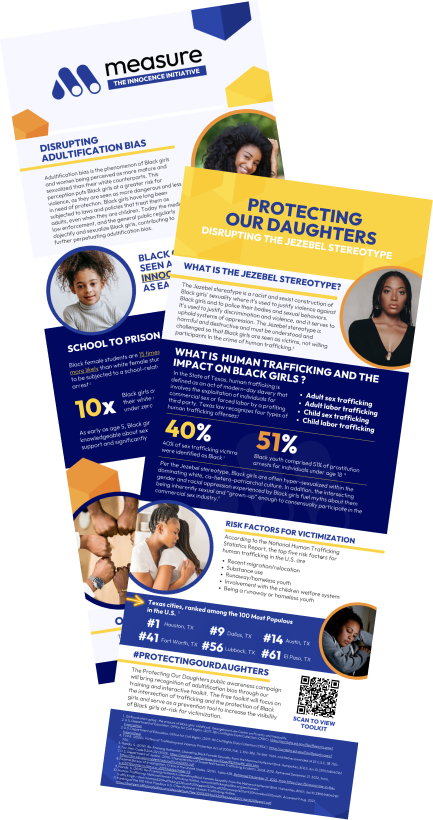
The Innocence Initiative is designed to educate and build awareness about adultification bias. Adultification bias is a form of racial prejudice where Black and Brown children are treated by adults as being more mature than they actually are. Black girls are disproportionately affected by adultification bias. We elevate the data, amplify the real-life stories of Black girls, and address disparities that perpetuate adultification through advocacy and training.
DID YOU KNOW?
Adultification bias stems from deeply ingrained stereotypes that unfairly depict Black and Brown children as older and more mature than they actually are. This harmful perception often results in these children facing stricter disciplinary action, increased scrutiny, and less empathy and support compared to their white peers.


15X
Black girls are 15 times more likely than white girls to experience a school-related arrest*

4.5X
Law enforcement officers are 4.5 times more likely to overestimate the age of Black and Hispanic boys than white boys**

18X
Black children are 18 times more likely to be tried as adults compared to white children**
* Source: Morris, E. W., & Perry, B. L. (2017). Girls behaving badly? Race, gender, and subjective evaluation in the discipline of African American girls. Sociology of Education, 90(2), 127-148. https://doi.org/10.1177/0038040717694876
** Source: Goff, P. A., Jackson, M. C., Di Leone, B. A., Culotta, C. M., & DiTomasso, N. A. (2014). The essence of innocence: Consequences of dehumanizing Black children. Journal of Personality and Social Psychology, 106(4), 526–545. https://doi.org/10.1037/a0035663

BLACK GIRLS ARE SEEN AS LESS INNOCENT
as early as age
5
Source: Girlhood Interrupted: The erasure of Black Girls’ Childhood. Rebecca Epstein Jamilia J Blake Thalia Gonzalez Georgetown Law Center on Poverty and Inequality.

BE PART OF THE CHANGE
If you’ve heard Black girls labeled as “fast” or “grown,” or Black and Hispanic boys called “men” by police, you’ve witnessed adultification bias in action. BIPOC children are often perceived and treated as older than they are, stripping them of their innocence and subjecting them to unfair treatment.
You have the power to CHANGE that.
Our interactive trainings equip parents, teachers, community groups, and those in the criminal legal system with equitable evaluation frameworks to combat adultification bias. We believe Black girls are our proxy for change, and by centering their stories, we uncover the intersections of race, gender, and class. Our expert-led sessions guide participants in evaluating the impact of adultification bias within their communities, educating them on effective tools for change, and activating them to translate data into policies that foster safer, more equitable environments for youth.
BREAKTHE CYCLE
Register for our next training or request one for your group.
Don’t just take our word for it. Our training has reached over 1,000 attorneys, as well as numerous organizations and community members. Every participant reported gaining valuable insights, showcasing the tangible impact of our sessions.




… always remember to include, see, and be mindful of Black girls.
“Measure’s Disrupting Adultification Bias training is invaluable in its lasting call to action: always remember to include, see, and be mindful of Black girls. Specific to my work, the call serves as a reminder to tend to the most marginalized youth through direct services, curriculum development, evaluation processes, organization policies, and so much more. My understanding has become that by serving and prioritizing the needs of Black girls, we’ll be able to best serve everyone as opposed to assuming and hoping that Black girls will be tended to by current conditions. We know that’s not the case and it’s up to us to make necessary changes with their best interest in heart. I’m grateful for this training and the passion Measure brings to this work.”
Angela Montijo, Licensed Master Social Worker
Juvenile Justice Program Facilitator, Girls Empowerment Network
PROTECTING OUR DAUGHTERS
How Adultification Bias Impacts Girls
Adultification bias disproportionately impacts Black girls, who are often seen as more mature, less vulnerable, and more knowledgeable about adult topics. These biases perpetuate harmful beliefs that Black girls need less protection and care, reinforcing damaging stereotypes that can sexualize them at a young age. Such perceptions strip them of their childhood and increase their risk of exploitation, including human trafficking.
As we confront these systemic challenges, we recognize that Black girls are our proxy for change and central to the solution. Their experiences provide crucial insights into the deeper inequalities of race, gender, and class. By centering Black girls in our research, we uncover broader disparities and create data-driven solutions that uplift all marginalized communities.
To tackle these critical issues, we’ve partnered with Truckers Against Trafficking on our Protecting Our Daughters campaign. This initiative aims to educate and engage community members who can identify and support victims of human trafficking, with a focus on addressing the role of adultification bias in these injustices.
Discover the full scope of our research in Austin, TX by reading our Black Paper: Disrupting the Jezebel Stereotype.
RESOURCES FOR CHANGE
Our Advocacy and Policy Initiatives



